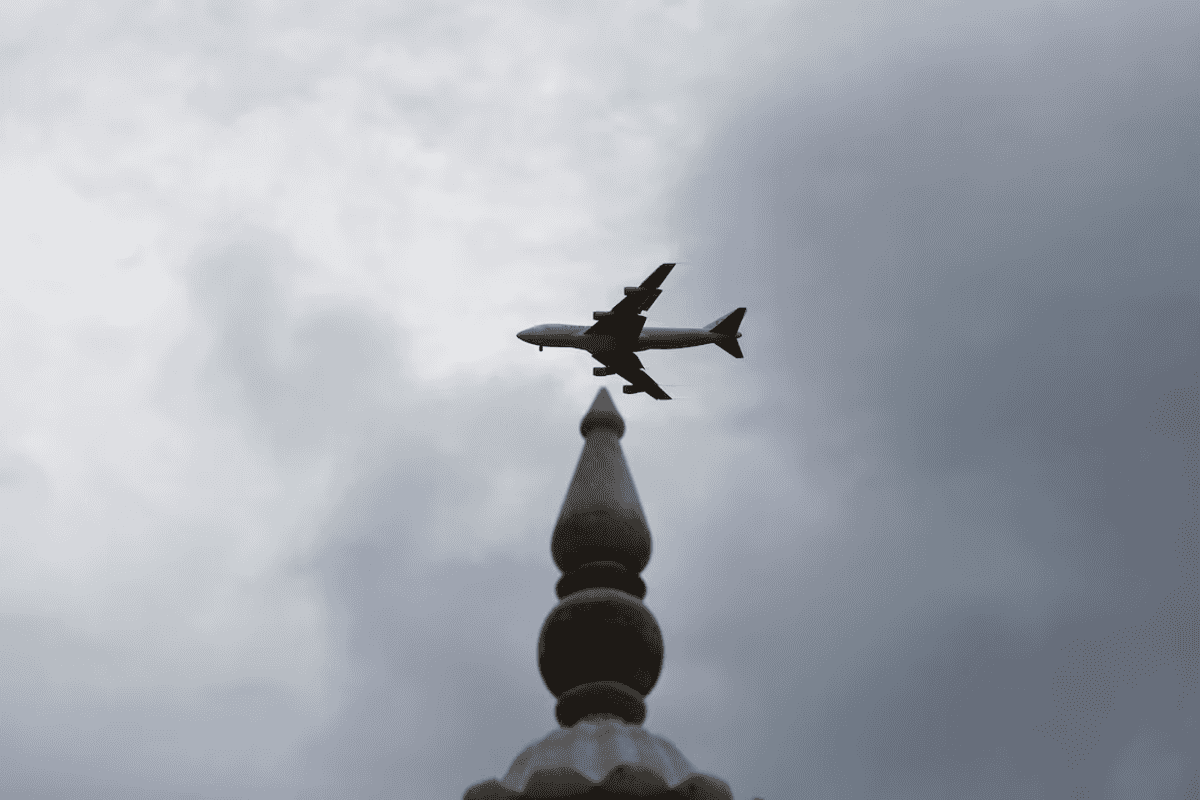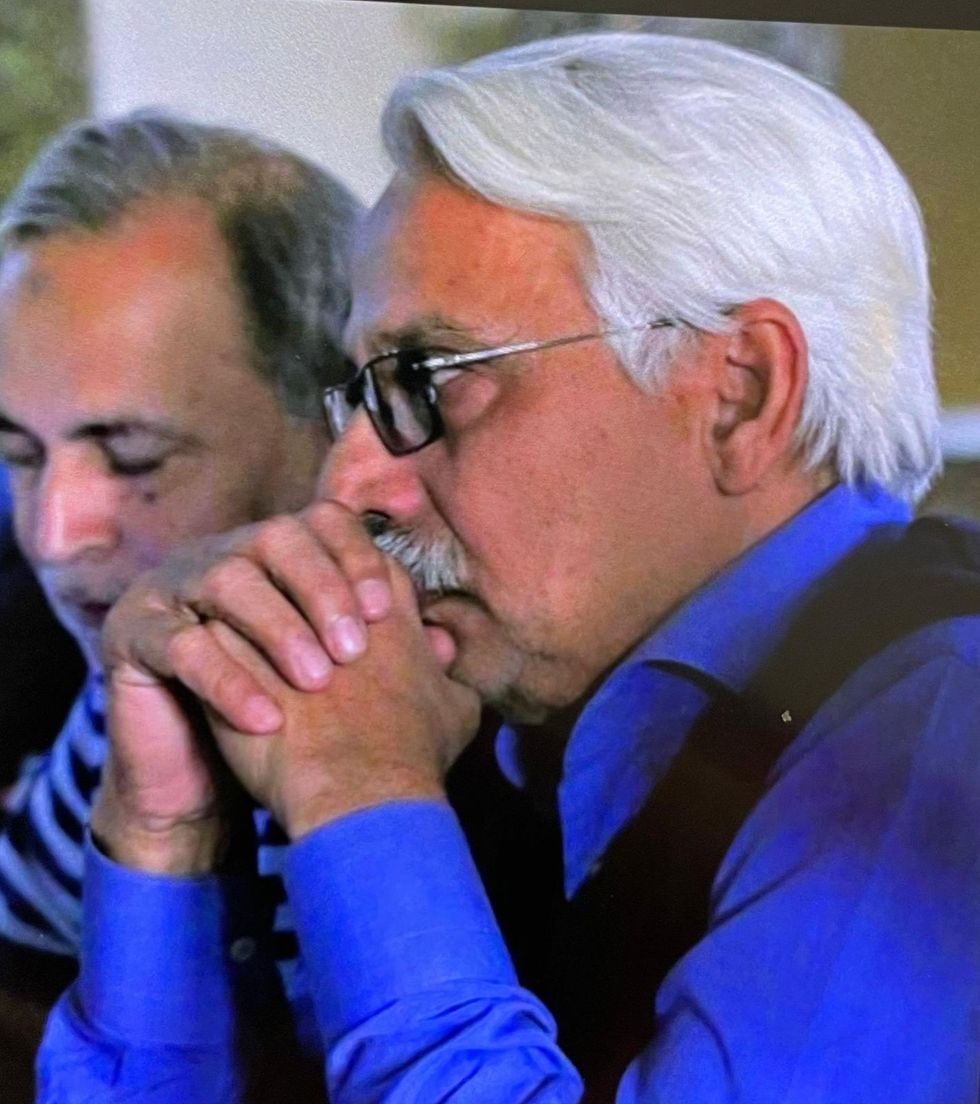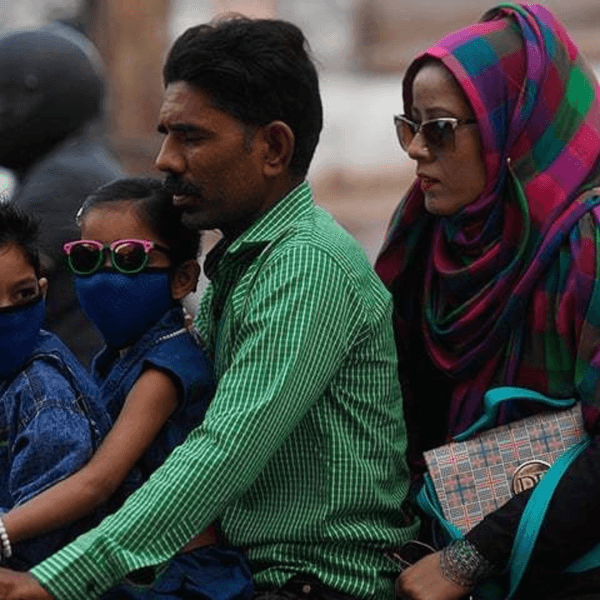Crisis in the skies: The human toll of Pakistan’s airspace closures
Some travelers faced panic and sleepless nights, especially those with vulnerable companions

Laiba Zainab
Correspondent
Laiba Zainab is an award-winning journalist with nearly a decade of experience in digital media. She has received the DW & CEJ-IBA Data Journalism Award and the top digital media prize at the National Media Fellowship. At NUKTA, she covers underreported stories on health, crime, and social justice.

A plane flies past a monumemt with the rain clouds in the background, during the monsoon season in Karachi.
Reuters
Pakistan’s decision to reopen its airspace after a sudden ceasefire with India brought relief — but not before days of chaos left thousands of travelers stranded, anxious, and emotionally drained.
The closure, which began without warning on the night of May 7, came amid an escalating military confrontation between the two nuclear-armed neighbors. With little to no official notice, flights were abruptly cancelled, airports fell into confusion, and passengers — many traveling for urgent personal reasons — were left scrambling for answers.
In the days that followed, the unpredictability of flight operations mirrored the volatility in the region. Schedules were revised by the hour. Some departures were reinstated, only to be cancelled minutes later. Travelers found themselves helpless, their plans shredded, their wallets strained. Those using third-party booking platforms faced particular difficulties, often receiving updates too late to act or struggling to retrieve refunds from overwhelmed systems.
Even after the ceasefire announcement, flight operations have remained patchy. Airlines are cautiously restoring services, but uncertainty continues to hang over future schedules. And for many passengers, the psychological fallout of the ordeal has proven just as scarring as the logistical disruption.
Some travelers reported panic attacks and sleepless nights, especially those traveling with children or loved ones requiring special care. Half-empty planes departed under tense skies. Terminals, once bustling, stood eerily quiet — not with order, but with uncertainty.
More than just a travel disruption, the crisis revealed how exposed civilians are when geopolitical conflict collides with commercial infrastructure. It also raised urgent questions: How can airlines and governments better communicate in fast-moving crises? And how can travelers — especially the most vulnerable — be better protected?
In exclusive conversations with Nukta, several affected travelers shared firsthand accounts of how the crisis upended their lives -- emotionally, financially, and logistically.
Nabahat Shireen (special needs support worker)
I’m a U.K. resident originally from Islamabad. I had come back to attend family weddings and brought my foster daughter with me — she has special needs, and I wanted to give her a few peaceful weeks away. Everything was fine until the night we were supposed to leave.
While packing, a friend from the U.K. called to say India had attacked Pakistan. At first, I didn’t believe it. Then we turned on the TV and saw the news: the airspace was closed. Flights were cancelled. Just like that, everything fell apart.
My daughter’s medication was meant to last only four weeks. We were at the end of our trip, prepared to return — mentally, physically — but suddenly we were stuck in a frightening situation with no answers. The panic, the fear, the uncertainty... for hours, we were just blank.

We tried calling the airlines, but the lines were jammed. No guidance, no clarity — just silence. British Airways eventually offered us a refund or to rebook if the situation improved, but even they had no clear information.
I kept wondering: What if this lasts for weeks? Months? How will I care for her? I had done everything to prepare, but this was beyond anyone’s control.
What this experience taught me is that no matter how ready you think you are, fate can turn your world upside down in an instant. We can’t live in fear, but we also can’t afford to be unprepared — especially when caring for someone vulnerable.
This whole ordeal was heartbreaking, not just for me, but for what it says about the world. Ordinary people shouldn’t have to suffer because of politics or war. And yet, here we are.
Aradhiya Khan (trans rights activist)
When news of the airspace closure broke around May 7, I was en route from Lahore to Karachi—my first flight in eight weeks. The next day, everything ground to a halt. My flight was abruptly cancelled, and with it, all sense of control. The airline offered no proper updates: no one answered calls, and their digital platforms remained mostly silent. It felt like being trapped in a vacuum.
Mentally, I was already in a fragile place. I needed to be home—to see my family, to resume work. But instead, I was immobilized by uncertainty. The added fear of regional conflict intensified everything. I couldn’t eat. I couldn’t sleep. Even when I finally boarded a rescheduled flight, dread accompanied me to the gate: What if something happened mid-air? What if drones struck? Ours was the only flight taking off. The silence in the terminal was deafening.

The disruption didn’t end with the flight. My return to normalcy was delayed; my routine was shattered. Some people suggested I travel by road, but as a solo traveler and a member of a marginalized community, that wasn’t a safe option, especially during civil unrest. Financially, it hurt too. I had to rebook tickets, dip into emergency funds, and plan every detail on my own while scouring websites and chasing down customer support.
Eventually, the airlines started responding. But the lack of early guidance made the ordeal far more difficult than it needed to be. This experience left me feeling hollow—adrift in a world where no amount of planning could guarantee stability. I’ve learned to prepare better: book smarter, keep backups, stash extra money. Still, nothing really prepares you for the eerie helplessness of waiting for something—anything—to go right.
Buraq Shabbir (journalist)
I was all set to fly from Karachi to Lahore on the morning of May 7 for the Lux Style Awards. Bags packed, outfit sorted, flight scheduled. But when I woke up and turned on my Wi-Fi, my phone was flooded with messages: the airspace had been closed overnight. My flight was cancelled. So was the event. Just like that, the day collapsed into stillness. I shut everything off and went back to sleep. “Maybe,” I thought, “I wasn’t meant to be anywhere today.”
The initial disappointment was manageable—organizers had arranged everything, so I didn’t have to worry about rescheduling or refunds. But what hit harder was the threat to my long-awaited personal trip to Turkey. I had meticulously planned and self-funded it—booked flights, internal travel, hotel stays. My international departure was scheduled for 4:25 a.m. on May 12. At first, I clung to hope. But as closures continued and flight statuses shifted by the hour, that hope eroded.
By May 10, reality set in: I received a cancellation email.

The emotional weight was crushing. I didn’t know whether to seek a refund, rebook, or just wait in limbo. The booking platform was unresponsive, likely overwhelmed. And time was slipping fast: my Turkish itinerary was scheduled to begin May 15. Every hour of uncertainty added to potential losses.
Ticket prices, meanwhile, had exploded—soaring from PKR 160,000 to nearly PKR 1 million. It was absurd. I scrambled—consulted travel agents, checked alternate routes, compared options with friends. Eventually, after days of frantic calls and anxiety, I secured a new booking directly through the airline. It was for two days later, on a different route.
That moment was a wake-up call: in times of crisis, don’t rely solely on third-party platforms. Go direct, stay informed, and prepare for the unpredictable. This was my first international trip planned entirely by myself—and it ended up being a masterclass in navigating chaos. The biggest lesson? You can do everything right—visa in hand, bookings confirmed, itinerary polished—but no one plans for war. From now on, I will.
Syed Mehboob Akber (business owner)
I had finally booked my seat on PIA flight PK-301 for Sunday morning and felt a wave of relief—after days of turmoil, I thought I was finally in the clear. But that calm didn’t last long. On Saturday evening, I received a video message from PIA: all airports were closed due to the escalating war situation. My flight was cancelled.

Still confused, I decided to call PIA directly later that night. To my astonishment, they told me the flight had been reinstated and was now scheduled to depart as planned. I was caught between disbelief and hope. At the airport the next morning, I was met with an eerie calm. The usually crowded terminal was nearly empty. My flight did eventually take off—but with barely half the seats filled. It was a quiet, tense journey, one I won’t forget anytime soon.
Anonymous (senior official at a financial institution)
The sudden cancellations weren’t just difficult for people on the ground—they were devastating for those already in transit. I personally know of around 70 passengers traveling from China to Karachi via Thai Airways who were left stranded at Bangkok Airport for three nights. With no access to their checked luggage, they were forced to sleep at the airport while the airline refused to arrange hotel stays, offering only basic food vouchers.
It was an appalling failure of duty and a blatant violation of passenger rights. No one stepped in. No one held the airline accountable. These passengers were left abandoned in a foreign airport, casualties of a system that shuts down when it’s needed the most.







Comments
See what people are discussing